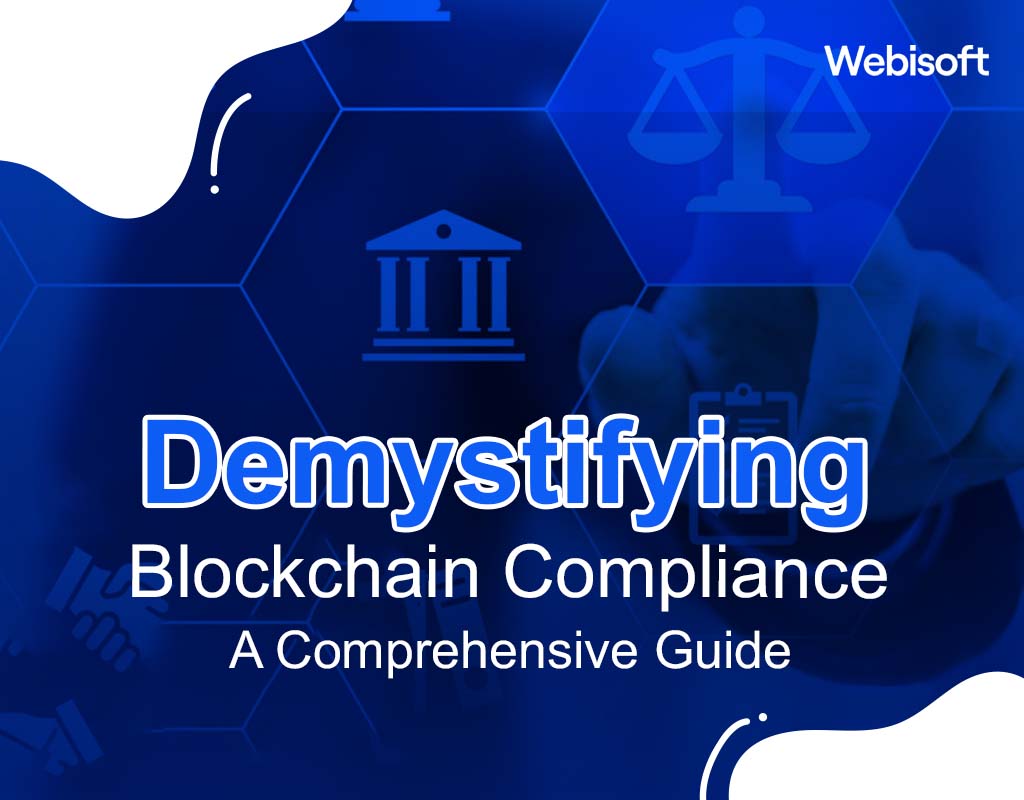In the age of blockchain technology, businesses and individuals engaged in blockchain-based activities must ensure compliance. Failing to do so would leave the network operator vulnerable to illegal activities that could compromise its integrity and trust.
Getting blockchain technology integrated into existing regulatory frameworks is crucial for ensuring its safe and responsible use. With that thought, we’ll discuss elaborately on blockchain compliance. We’ll deep dive into everything so that you end up knowing the ins and outs of it.
Contents
- 1 What is Blockchain Analysis?
- 2 How does Blockchain Analysis Software Monitor?
- 3 What are the Uses of Blockchain Analysis software?
- 4 What are the Main Characteristics of Monitoring Software and Blockchain Analysis?
- 5 What is the Importance of Blockchain Analytics?
- 6 Does Blockchain Analysis Pose Any Challenges?
- 7 Wrapping Up
What is Blockchain Analysis?

Blockchain analysis refers to the process of examining, classifying, and overseeing blockchain addresses and transactions. That way you can gain a deeper understanding of the actions taken by various participants within the blockchain ecosystem.
Enterprises and businesses utilizing blockchain-based applications must leverage blockchain analysis solutions to ensure compliance with regulations and mitigate the risk of involvement in illicit financial activities.
Exploring the Toolbox of Blockchain Analysis

The full spectrum of blockchain analysis solutions includes tools for monitoring, evaluating, and investigating transactions.
The primary objective revolves around establishing connections between blockchain addresses and real-world identities. Thus, it empowers analysts with the means to scrutinize transactional behavior. The core functionalities offered by blockchain analysis tools include:
Classification of Addresses
A popular application of blockchain analysis software involves establishing connections between blockchain addresses and real-world identities. It’s like putting the puzzle pieces together to make sense of the bigger picture.
These tools employ diverse methods to identify tangible entities within the blockchain realm.
Analysis of Transactions and Risks
Effective blockchain analysis software enables you to monitor every transaction involving your company and evaluate the associated risks. You can track the origin of funds, analyze money movements, and delve into the transaction history of both senders and recipients.
Tools for Investigation
Blockchain analysis software equips you with visualization tools to manually investigate transactions and blockchain addresses. It’s like having a magnifying glass to examine the details and gain deeper insights into the flow of funds.
How does Blockchain Analysis Software Monitor?

Blockchain analysis software achieves monitoring functionality through various techniques. Clustering algorithms, scam database monitoring, site scraping, and dust threat detection are used to determine the true identities behind blockchain addresses.
Analytic tools use clustering to identify different blockchain entities like exchanges, payment processors, and wallets. By displaying transaction graphs, Investigation Tools take it a step further, allowing analysts to view the relationships between transactions visually.
To assess risk, sophisticated risk models are developed and trained using machine learning. Each blockchain transaction receives a risk score based on factors such as transaction amount, source of funds, and money flow patterns.
By employing these techniques and technologies, blockchain application experts empowers businesses to monitor and analyze blockchain activities. Finally, it uncovers hidden connections and evaluates potential risks effectively.
With Webisoft’s expertise in Solidity, Ethereum Layer 2, Polygon, Terraform, and Rust businesses can implement cutting-edge Blockchain Analysis Software. It monitors blockchain activities, identifies true identities, and assesses potential risks through clustering algorithms and machine learning models.
What are the Uses of Blockchain Analysis software?

One major area where Blockchain Analysis software comes in handy is the regulatory space or RegTech. This technology aids companies in adhering to regulatory requirements, making it a crucial aspect of blockchain analysis.
By utilizing blockchain analysis software, organizations can mitigate risks and ensure their blockchain network is in line with regulatory standards.
Here are some common applications of this software —
Compliance
It helps virtual asset service providers by implementing solutions that reduce risks and enable effective monitoring. With AML-CFT solutions, it aids in eliminating fraud and financial crimes.
These tools track every transaction associated with your company and assess the associated risks, all to meet regulatory compliance requirements. You can even set specific norms and standards based on your jurisdiction.
Investigations and Surveillance
Blockchain analysis software plays a vital role in surveillance and investigations when it comes to blockchain and cryptocurrencies. Law enforcement relies on this technology to trace the flow of funds and identify criminals.
For instance, if someone converts illicit money into cryptocurrency using a blockchain service, these analysis tools can uncover the transaction and, if the service has a robust KYC (Know Your Client) system, reveal the true identity of the criminal.
Additionally, the software provides visual aids and employs clustering techniques to enhance manual investigations.
Navigation of Funds
When it comes to a blockchain platform, funds flow in from various sources, which can be quite challenging to analyze all at once. That’s where fund navigation comes into play.
It assists in tracing potential risks associated with transactions, allowing us to determine the accuracy and identify any faults in the source of funds.
What are the Main Characteristics of Monitoring Software and Blockchain Analysis?

Let’s explore some key features of a compliance dApp that focuses on blockchain analysis and monitoring:
Knowing Your Transactions (KYT)
It’s designed to identify risky blockchain transactions originating from darknet markets, fraudsters, or sanctioned addresses. KYT offers a user-friendly interface, making it suitable for beginners to analyze and investigate transactions.
Moreover, it provides valuable information about the true identities behind blockchain addresses, which proves crucial in cryptocurrency investigations.
Monitoring and Investigation
This feature offers an interface to examine digital currency transactions. Through automatic route detection, you can visualize the flow of transactions and funds on the blockchain.
The dApp continuously monitors blockchain wallets, aiming to identify and prevent fraudulent activities. Additionally, it assesses the risk level of transactions by observing any unusual behavior or emerging trends.
Virtual Asset Service Providers (VASPs)
Virtual Asset Service Providers (VASPs) take the role in risk monitoring and regulatory compliance. VASPs offer solutions that support various tokens, verify client identities, track crypto-money transactions, and facilitate law enforcement inspections.
In managing virtual assets, VASPs assist in ensuring regulatory oversight and achieving blockchain compliance, making them valuable partners.
Navigation Assistance
This feature offers robust tracing capabilities and customizable risk rules. Thus, you can gain a clear and accurate understanding of the origin and destination of funds.
With navigation assistance, you can ensure virtual data protection for your business and clients on digital platforms. Now, that’s peace of mind in today’s interconnected world.
What is the Importance of Blockchain Analytics?

Blockchain analytics is crucial for companies using blockchain technology. They need a clear picture of the ecosystem to ensure efficiency and compliance. Analyzing on-chain data helps identify and remove underperforming or illicit participants, protecting the system’s integrity.
It empowers businesses to adapt and succeed in an interconnected future. Plus, saves resources and time, enabling informed decision-making and sustainable growth.
Companies, regardless of industry, rely on blockchain analytics for a comprehensive understanding of their operations. Using it, they can monitor and optimize their blockchain-based processes, resulting in better performance.
In a rapidly evolving digital landscape, blockchain analytics is a valuable tool for maintaining transparency, security, and operational excellence.
Does Blockchain Analysis Pose Any Challenges?

Anonymity techniques like mixers, multiple wallets, and non-compliant exchanges pose obstacles. It’s common for seasoned criminals and knowledgeable crypto investors to exploit these strategies to outwit forensic organizations and monitoring tools.
For example, mixers are a common method where multiple senders’ inputs are aggregated, disguising their addresses. As a result, the original sender remains hidden, rendering other addresses untraceable.
Mixers, also known as tumblers, merge different streams of potentially traceable crypto assets, enhancing transaction anonymity and making tracking more difficult.
Similarly, criminals create multiple wallets and conduct transactions between them, making investigations more challenging for law enforcement. Scammers and criminals can bypass KYC requirements by using non-compliant exchanges, making it easier to evade blockchain analysis.
It’s important to stay on top of evolving tactics used by those trying to hide their activity by constantly innovating and adapting blockchain analysis.
Wrapping Up
In conclusion, blockchain compliance plays a pivotal role in ensuring the trustworthiness and regulatory adherence of blockchain networks. Using it, you can mitigate risks, foster compliance, and navigate the evolving blockchain landscape with confidence.
It ensures user privacy, authenticates genuine users, and eradicates fraudulent activities. Without it, law enforcement and cryptocurrency firms would lack crucial insights. As organizations strive to leverage the potential of blockchain, partnering with a trusted technology provider becomes crucial. As a leading blockchain solutions provider, Webisoft can help you with blockchain development or even compliance. Reach out to Webisoft today for a consultation and customized blockchain compliance solutions.
